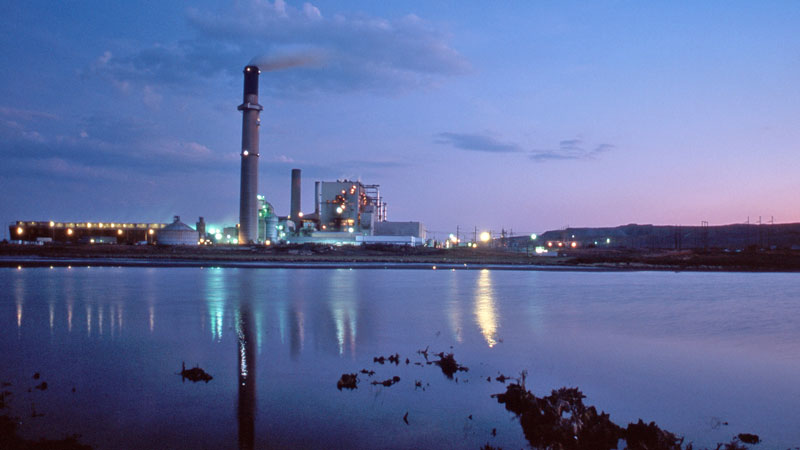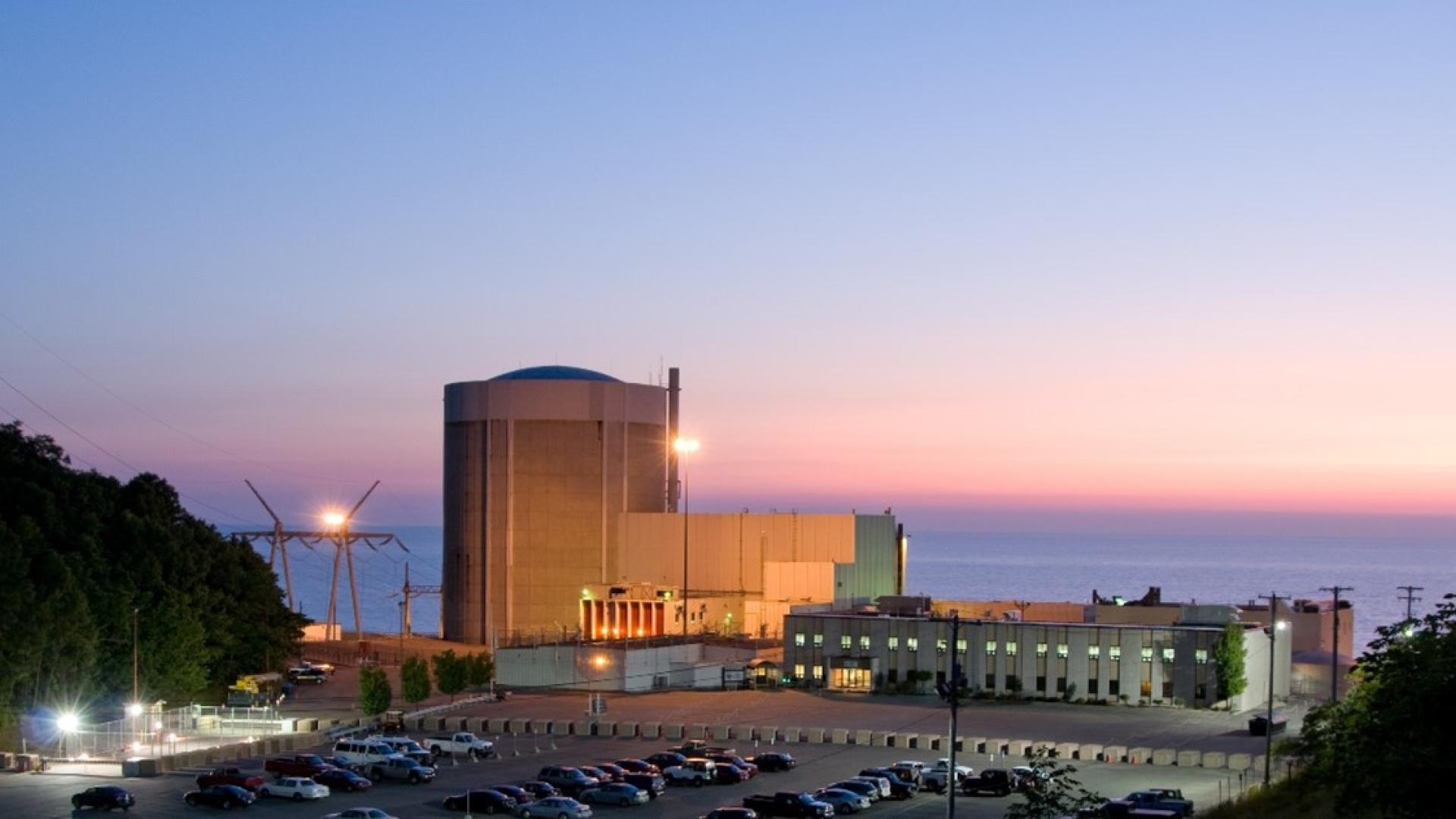The Naughton coal-fired power plant near Kemmerer, Wyo., has two units set to retire in 2025 and be replaced by a TerraPower Natrium reactor. (Photo: PacifiCorp)
Nuclear power generation surpassed coal generation in the United States for the first time in 2020. As utilities continue to retire coal-fired plants, reusing the shuttered sites to host nuclear reactors could help the nation reach the goal of net-zero emissions by 2050 and prove economically beneficial both for nuclear deployments and for the communities impacted by fossil fuel generation. That’s according to a Department of Energy report released this week, detailing how hundreds of U.S. coal power plant sites that have recently retired or plan to close within the decade could be suitable for new nuclear power plants. Nuclear power’s high capacity factors mean those plants could deliver an added benefit—delivering more baseload power to the grid from the nameplate capacity replacement.
Interest rates have an outsized impact on nuclear power costs compared to those for other methods of power generation. (Source: World Nuclear Association)
In an essay titled “How the Fed will Strangle New Nukes,” published this week by American Thinker, nuclear engineer and writer Joseph Somsel warns that despite current expectations of a nuclear construction boom, “As in the late 1970s, rising interest rates will put the kibosh on new nukes.” Somsel therefore urges the financing and building of new nuclear facilities right now, before ongoing inflation and increasingly high interest rates “kill a lot of the plans” for new nuclear power plants.
Demolition has begun on the Bulk Shielding Reactor at the Oak Ridge National Laboratory. It marks the first teardown of a former reactor at the site. (Photo: DOE).
In a first for the Department of Energy’s Oak Ridge Site, a former reactor facility is being demolished. The site’s cleanup contractor, UCOR, began tearing down the Bulk Shielding Reactor, also known as Building 3010, last week.
“While this project is not the biggest demolition we’ve undertaken, it carries a lot of significance,” said Laura Wilkerson, acting manager for the Oak Ridge Office of the DOE’s Office of Environmental Management (EM). “It is the first removal of a former reactor at [Oak Ridge National Laboratory], and it is a signal of much more to come at the site in the immediate future.”
The Continuous Electron Beam Accelerator Facility at Jefferson Lab. (Source: Jefferson Lab)
Research with the Department of Energy’s Thomas Jefferson National Accelerator Facility (Jefferson Lab) has revealed new insights into short-range correlations—the brief pairings of nucleons (protons with neutrons, protons with protons, or neutrons with neutrons) in the nuclei of atoms. The study, published in Nature, used precision measurements to determine that short-range correlations differ depending on the density of the nucleus, that is, how many nucleons it contains.
An illustration of Switzerland’s proposed deep geological repository. (Image: Nagra)
Nagra, Switzerland’s national cooperative for the disposal of radioactive waste, has announced that it has selected Nördlich Lägern as the site for a deep geological repository for radioactive waste. According to Nagra, extensive investigations have shown that Nördlich Lägern, located in northern Switzerland near the German border, is the most suitable area for a geologic repository with the best overall safety reserves.
An aerial view of Westinghouse’s Columbia Fuel Fabrication Facility in Hopkins, S.C. (Photo: Westinghouse)
The Nuclear Regulatory Commission yesterday announced that it has issued a renewed license for Westinghouse Electric Company’s Columbia Fuel Fabrication Facility (CFFF), authorizing operations at the plant for another 40 years—through September 12, 2062.
Located in Hopkins, S.C., the CFFF manufactures fuel rods for use in commercial nuclear reactors. According to Westinghouse, 10 percent of the nation’s electricity comes from the fuel manufactured at the facility.
A clinical dose of At-211 is prepared at the University of Washington for use in a Fred Hutchison Cancer Center clinical trial. (Photo: UW/Don Hamlin)
Scientists in the Departments of Radiation Oncology and Medicine at the University of Washington (UW) and Fred Hutchinson Cancer Center (Fred Hutch) are directly targeting cancerous cells traveling through patients’ bloodstreams with diseases such as leukemia and lymphoma using an intravenous injection of the radioactive isotope astatine-211 (At-211). The work, its challenges, and its promise were described in a recent news release from the National Isotope Development Center (NIDC), which is managed by the Department of Energy’s Isotope Program.
The Palisades nuclear power plant. (Photo: Entergy)
Maybe hold off commenting on those Palisades decommissioning plans for now: Michigan Gov. Gretchen Whitmer last Friday penned a letter to energy secretary Jennifer Granholm pledging state support for a Holtec International plan to restart the recently shuttered Palisades nuclear plant in Covert, Mich. It was Whitmer’s second letter to the Department of Energy head expressing support for Palisades and touting its value to the state.
The Palisades nuclear power plant.
The Nuclear Regulatory Commission has made Holtec International’s post-shutdown decommissioning activities report (PSDAR) for the closed Palisades nuclear power plant available for public comment until December 27. The NRC also plans to hold a public meeting to discuss the report on the evening of September 22 at the South Haven campus of Lake Michigan College, about 10 miles north of the Palisades site in Covert, Mich.
The vacuum vessel of the WEST. (Photo: CEA)
Research by scientists at the Department of Energy’s Princeton Plasma Physics Laboratory (PPPL) and collaborating institutions has the potential to improve plasma performance in tokamak nuclear fusion reactors, according to a recent paper in Nuclear Fusion. The research focused on the use of a PPPL-developed dropper to apply coatings of boron powder to the tungsten components inside a tokamak, thereby helping protect the tungsten against the intensely hot plasma. According to lead author Grant Bodner, this process offers “a way to deposit boron coatings without turning off the tokamaks’ magnetic field.”
IAEA director general Rafael Mariano Grossi (at right) inspects damage at Ukraine’s Zaporizhzhia plant on September 1. (Photo: Fredrik Dahl/IAEA)
HALEU in the form of 1.5–3 kg reguli ready for fuel fabrication. (Photo: INL)
Those who welcomed the $700 million earmarked for high-assay low-enriched uranium (HALEU) supply in the Inflation Reduction Act of 2022 (IRA) in August have cause to celebrate again. The White House sent a supplemental appropriation request to Congress on September 2 that would provide more than double the IRA funds if passed—$1.5 billion—for the Department of Energy’s Office of Nuclear Energy to build a reliable supply of both low-enriched uranium for existing U.S. nuclear power plants and HALEU for the advanced reactors that will be built within the decade.
Artistic rendering of a Rolls-Royce SMR plant. (Image: Rolls-Royce)
Just one week after entering into an exclusive agreement with a Dutch nuclear development company to deploy small modular reactors in the Netherlands, U.K.-based Rolls-Royce SMR has announced the signing of a memorandum of understanding with Škoda JS to explore “areas of collaboration” for SMR deployment in both the Czech Republic and elsewhere in Central Europe.












 The Nuclear Regulatory Commission last Friday announced the publication of its
The Nuclear Regulatory Commission last Friday announced the publication of its 



